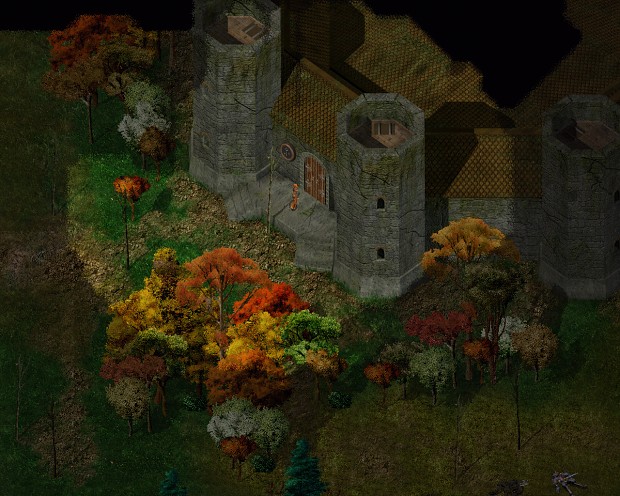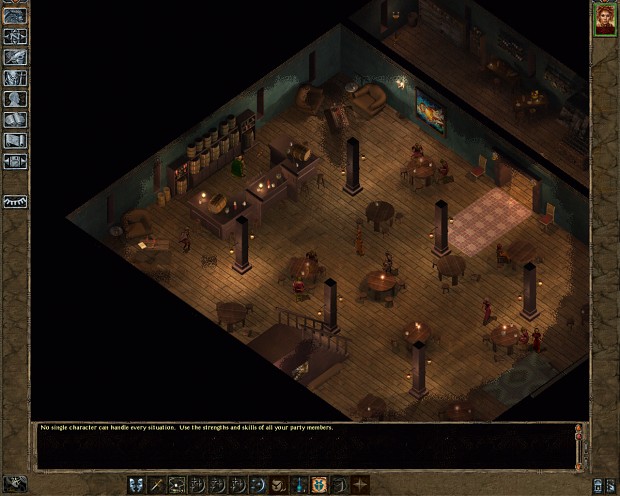This blog post was inspired by What is the most beautiful game you've ever played? thread.
Gameplay vs graphics vs plot/story
Which of these is the most important part of a video game? Gameplay? Graphics? Plot, story?
Actually it's an evasive, inaccurate question: importance means nothing here since it's just a highly opiniated personal feeling, it's rather what you focus on in the short run, at a first glance, and what you focus on in the long run, after playing a specific game tens/hundreds of times - especially if you had many "returns", "breaks" and "disengagements".
So what do you focus on before buying, when playing a game? In the short, long run?
Focusing here on:
1) game graphics, or rather the feel of graphics, the style of graphics
2) story
3) and in the long run, many years after the last play... game plot/story again
Well, actually focusing on the game genre first - mainly plaing RTS/RPGs and action "RPGs"/"adventures" (GTA, Saints Row) so that's the real first ninja-thing on the list here.
1. Game graphics vs graphics style?
The question itself begs the question, does it?
Why divide it into game graphics and graphics style all of a sudden? Answers are simple, they begin with "Minecraft" and the "integral part of the game or the gameplay". As a developer noticed here in this thread, there is a huge difference between intentional "bad" graphics and unintentional bad graphics.
Intentional "bad" graphics:
- pixel art
- 2D (or pseudo-2D, some games such as old C&C games mainly use 2D sprites, 3D voxels and the 3D projection, so they are 2D-looking 3D games, 2.5D games)
- text-based
"bad" graphics" which are not "bad" at all, they can only look bad to some people - at least to as few as possible, hopefully. The classic example is Minecraft. The other example is all other pixel art games - where pixelart is not only spotlighted as the main exterior feature but also mastered to perfection.
Unintentional "bad" graphics caused by
- developer's intentional or unintentional omittance, such as a low res texture in place of a high res one
- hardware limits (especially true for many "ancient" 3D games)
- and many other factors, such as time/financial constraints of a developer, etc.
So yes, definitely the graphics style here. It's whether developers succeed at perfecting their style, no matter the style.
Yes yes unfortunately looking at the graphics first when buying a game. The superficial graphics, the fakes. The shallow, banal, repeatable, empty side of the game.
Wouldn't play pixelly-3D Warcraft III, eye-candy Age of Empires III, unhandlable GTA III or tradition-breaking (GUI in the "wrong" place, crawling 3D-only graphics) C&C Generals for their graphics or their graphics style. Gameplay (features, balance, learning curve, non-story missions/challenges, general playability etc) maybe, but definitely not graphics.
Baldur's Gate, needed only a highres/widescreen mod + GUI correction:
^- no need for any retexture mods at all, after so many years. Originally released back in 1998, that makes Baldur's Gate about 15 years old.
2. and 3. Story?
Yes, the story, the plot, the characters-relationships-and-shit-is-happening-and-someone-has-to-do-something.
That's what... tries, keeps, forces? to return to the game, even after many years. (Yes Baldur's Gates, Icewind Dales, Fallouts looking right at you!)
If a game doesn't have any story - that's bad, since then only gameplay counts, instead of a story. Game balance and gameplay flaws (game breakers, both major and minor tangible nonfeatures) destroy the experience pretty hard. Can't play something that has nothing redeemable (ie a storyline to walk "on" or through and finish) about it to buy it out of its fake-centered misery.
IMHO, neither graphics nor gameplay gives a degree of depth to a game. Not even an ounce. But they are things that make video games immensely interactive, make them different from e.g. books or films. Yes there exist game books - but they are - as the name suggests - game books. Only the plot, the story element is something shared between videogames, books and films.
And as the concept suggests, the story is what acting, voice acting, dialogues convey and it's much less about action, which in moderate quantities serve to intensify experience instead of covering or diminishing the story. To be sincere, it's not always true - some bloodthirsty combat-ridden classics such as Baldur's Gate, Icewind Dale have lots and lots of enemies and opponents to overcome or simply send away packing from the world (to another miserable life in another video game world most likely) still manage to keep players returning to the game because of the usually world-crashing ultrachallenging story. Maybe because gamers ignore all the blood, combat and only remember the story itself? (Which probably gets sucked in by the long term memory.)
Can never know.
Ah, the last thing. The hard-hitting-in-the-face fragment of stories.
It's the revelation of the centrepiece of the story - the person, the thing that started havoc, caused the first riots, began state-gripping and realm-ripping intrigues, and other things turning-the-world-upside-down. It seems pretty awful if it is clearly revealed in the prologue, or the first or the second chapter.
Was extremely enjoying Dragon Age Origins as far as gameplay goes - the thing is - it has all the shitty banalities (especially the "Horde" ouch!), and the plot is revealed right in the prologue and the first chapter. Defeat the evil dragon-demon blah blah and save the kingdom blah blah, slash through evilish hardish hordish mess of monsters blah blah, and all that tropefied... stuff. So in the end, enjoyed Dragon Age II more which was less centered on extreme banalities and the "standard" fantasy side. The Dragon Age II story also seemed to be much less banal than DaO's.
To compare, Baldur's Gate I:
1) what's going on is revealed in the Chapter 6 (unless you know D&D/Forgotten Realms history very well, you basically have no idea of what is going on)
2) the main boss/opponent is encountered at the end of prologue
3) the centre piece is a conspiracy, but not that banal world domination or world destruction plot - but the (spoilers) apotheosis of the godspawn Sarevok - which tried neither to dominate or destroy the world, but to murder his siblings through assassinations or regional wars, to subvert some realms/regions either unknowingly or knowingly to fund his campaign against other children of dead god of murder Bhaal, and ultimately, to become the Lord of Murder himself
So Baldur's Gate feeds players with small bits of the story, of what-is-happening, gradually. Something that suspends mystery and lets it float like a fog over everything you are through.
Something plot-related that seems to be incredible improbable to be featured in the "newer" games. The element of mystery.
Can't believe that developers such as those of Dragon Age Origins (BioWare, but mainly the idea-guy of that... thing) could feed gamers with that fast foodish banalised thousand-times-repeated shit that should have nothing to do with the fantasy genre.
Yes extremely enjoyed DaO - gameplaywise, yet thoroughly loathed the banal plot and the setting. Couldn't return to it even twice (played only once through), while already finished Dragon Age II like 3 times - because of less banal story/setting mumbojumbo.
Another instance of the truth that mainstream sells stereotyped crap because such crap sells.
Uh, this blog post mutated and became longer than planned. Let's finish.
So. Looking at fakes first (graphics, graphics style, game genre), then in the middle and in the end at the game depth (story, plot). Mainly a single player here, that's why. Multi players would probably focus more on the gameplay rather than the story. To note, "player-initiated", custom role playing e.g. in MMOs would be a completely new subject to cover, and maybe something plot/story related as well. Would that count as story/plot or as gameplay? You decide.
Two questions for you.
What do you focus on in the short, long run? Was there any games that you made an exception for, that you played for entirely different reasons than normally?
Licence:  This whole text is licensed under Creative Commons Zero (public domain): Creativecommons.org can be diffused, copied, distributed, edited, published anywhere without any credit given.
This whole text is licensed under Creative Commons Zero (public domain): Creativecommons.org can be diffused, copied, distributed, edited, published anywhere without any credit given.


I play games for all those reasons. I played Tomb Raider for its graphics. Crysis 3 for its graphics. Bioshock infinite for the story. skyrim for mods. assassin's creed for its story and gameplay. the witcher for its story. the witcher 2 for its graphics, combat, and later story. star citizen for its graphics and gameplay. watchdogs for gameplay and graphics. so its sort of a mix (at least with newer games, since newer games have better gameplay mechanics and better graphics than old games) however if i play an old game its usually for the story. although i liked the gameplay in the jedi knight series:D
Graphics? I've never played a game just for the graphics, but there are games I've chosen not to play because the graphics was way too outdated and I had trouble deciphering what was going on.
Gameplay? Yes, there are a few games with no story that I've played, gameplay along making them fun. Like Quake II. But I've only played them with friends and not very often.
Story? For me it's the most important aspect of a game. And I don't mean just the main story a game tells, but also meaningful side-quests. Something intriguing, not just "go kill that monster" type of thing. So give me a game with a good story and I'll play it any day.